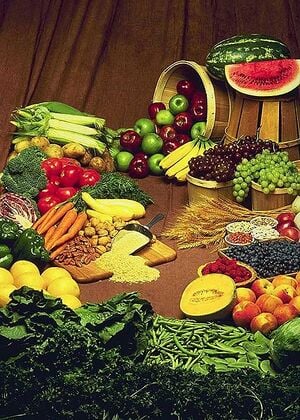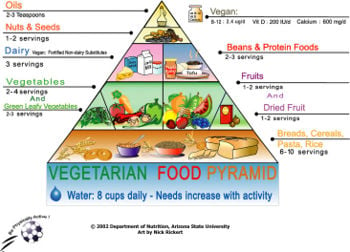
Vegetarianism is a diet or life-style choice that excludes the consumption of meat, seafood, poultry, and other animals. People may implement this to varying degrees of strictness (see #Occasional meat eaters). Many vegetarians will still eat eggs and/or dairy, sometimes restricting these to free-range or organic products. (Organic certification often includes a greater emphasis on animal welfare than conventional factory farming).
Veganism is a type of stringent vegetarianism, where even animal derived products, including dairy, eggs, and honey are not consumed. Many vegans avoid all animal products, such as leathers, furs, feathers, bone, etc.
Raw veganists, fruitarians, su vegetarians, religious vegetarians, and followers of macrobiotic diet are other types of vegetarians.[1]
Motivation for adopting a vegetarian/vegan diet[edit | edit source]

Some of the common reasons for vegetarianism include:
- Ethical, animal welfare - Many disagree with the killing of animals for food or other human purposes. Some modern farming practices like confined feeding operations or traditional practices like foie gras production may been seen as particularly cruel.
- Environmental - Typically greater resources are required to raise livestock than crops. Animal agriculture also has great impact on climate. Ocean fish stocks have depleted rapidly in recent decades.[2]
- Health - Some people have conditions that are made worse by the eating of some kinds of meat. Others feel better after adopting different vegetarian diets.
- Religious - Some religions or belief systems dictate avoidance of (certain) meats or other animal products. Includes: Jain and Buddhist vegetarianism, Sattvic diet, and Seventh-Day Adventist diets.
Occasional meat-eating[edit | edit source]
In some situations consuming animal products may be unavoidable. In social occasions like birthday or holiday meals it may be impossible to get a full, balanced meal with the vegetarian options available. When travelling there may be language and cultural barriers.
Nutrition[edit | edit source]

A properly planned vegetarian diet can be nutritionally adequate and meet current recommendations for all proteins, vitamins, and minerals that are necessary for all stages of a person’s life, including during pregnancy, lactation, infancy, childhood, and adolescence. Vegetarian diets offer a number of health benefits: lower levels of saturated fat, cholesterol, blood pressure, hypertension, type 2 diabetes, prostate and colon cancer, renal disease, osteoporosis, and lower rates of death from heart disease and obesity (Vegetarian Diets, 2003).
A vegetarian diet can have so many health benefits because it cuts out the negative health risks associated with consuming meat. For example, the consumption of meat has been correlated with an increased risk of getting many types of cancer. According to one study, “Both red and processed meat intakes were positively associated with cancers of the colorectum and lung; furthermore, red meat intake was associated with an elevated risk for cancers of the esophagus and liver” (Cross, 2007). A vegetarian diet also avoids other risks from eating meat. For example, a vegetarian diet avoids fish that are contaminated with high levels of mercury, as well as avoiding high concentrations of dioxins, artificial growth hormones, and antibiotics that are often found in factory-farmed animal protein. However, a vegetarian diet may also pose the risk of eating fruit and vegetables that are coated with pesticide residue (Nierenberg, 2006).
Some critics of vegetarianism say that a vegetarian diet doesn’t provide enough protein in the diet. However, while protein can be a concern for some diets if not planned properly, all 9 essential amino acids can be obtained by eating a variety of complementary plant sources and this is just as adequate and sustaining as protein from animal sources. Vegetarian sources of protein include rice, beans, hummus, grains, legumes, eggs, and dairy products (Young, 1994).
While a vegetarian diet can meet all requirements for a healthy diet and be beneficial to ones overall health, a bit more time and planning may be necessary to ensure all nutrient needs are met. A healthy vegan or vegetarian diet, or any diet low in animal products, hence requires additional intake of some nutritional elements:
Vitamin B12[edit | edit source]
Vitamin B12W is an issue in vegetarian and vegan diets (and often even in non-vegetarian diets) and a supplement is often required. Lack of B12 leads to fatigue, impairment of mental functioning and other serious effects.
B12 in the typical modern diet is generally found only in animal products. Actually B12 is produced only by certain types of bacteria, never directly by plants, animals or fungi, and it is found in animal products because those bacteria grow inside animals. Unfortunately there are not enough of such bacteria in the human digestive system to meet our needs (or the bacteria are too low in our digestive system) and we must get our B12 from elsewhere. B12 for supplements is produced by bacteria[verification needed] and so such supplements should be vegan (assuming there are no other animal products added - check the label).
In traditional diets, soil (which may contain B12-producting bacteria) insect parts and droppings of insects and other animals were likely to "contaminate" food, providing essential vitamin B12.[3]
Today, vitamin B12 deficiency is serious and widespread. A Tufts University study found that, of the individuals of the general population they studied, "nearly 40 percent had levels of B12 that were low enough to cause neurological symptoms",[4] making this a widespread issue, not only a vegan one.
In modern times with less "dirt" in our diets, vegan diets contain little B12. Small amounts are contained in mushrooms that are grown in manure, and may be contained in fermented drinks such as kombucha (if it is produced with a culture containing B12-producting bacteria).
It is also worth noting that different people have different requirements for B12. Nursing babies are particularly sensitive to vitamin B12 deficiency - in rare cases, where vegan and vegetarian mothers have had inadequate B12 in their diet and/or were not taking proper B12 supplements, the babies have suffered brain damage and even death.[verification needed][5]
Zinc and O3FA[edit | edit source]
In some vegetarian diets, people may consume too little zinc and omega 3 fatty acids (O3FA). See http://en.wikipedia.org/wiki/Vegetarian_nutrition
Protein[edit | edit source]
All of the amino acids the human body needs to synthesize proteins are available from vegan and vegetarian foods.
The nutritional value of plant-based diets in relation to human amino acid and protein requirements, Millward DJ. (Proc Nutr Soc. 1999) - PubMed Result] - This study suggests that "high-lysine maize supports similar weight and height growth to that of casein. Inadequate amino acid supply is not an issue with most cereal-based diets."
Human adult amino acid requirements: (1-13C) leucine balance evaluation of the efficiency of utilization and apparent requirements for wheat protein and lysine compared with those for milk protein in healthy adults, Millward et al. concluded that "The results show that adaptive mechanisms of lysine conservation allow wheat protein to be utilized more efficiently than expected."
Excuses[edit | edit source]
There are many excuses for not eating a cruelty-free diet, but very few of them hold up. There is always a vegetarian alternative which is equally complex in flavor and satisfying. That includes prime rib, pork BBQ, and chicken wings. The thing is that it takes more work from the chef, because the animal did the work to create the flavor in the meat-based diet. So keep this in mind when inventing delicious alternatives.
Vegetarian parenting[edit | edit source]

More and more children are growing up vegetarian or vegan. Some are raised vegetarian from birth by vegetarian parents. Other children choose vegetarianism on their own. Some parents and children transition at the same time.
Vegetarian children in non-vegetarian families[edit | edit source]
Non-vegetarians may find raising vegetarian children challenging.
Non-vegetarian children in vegetarian families[edit | edit source]
Some children raised vegetarian choose to start consuming meat.
Vegan families[edit | edit source]
Vegan children may need age-appropriate supplements.
Vegan parents sometimes receive legal scrutiny for (alleged) malnutrition. One extreme case of neglect ("a diet largely consisting of soy milk and apple juice") in providing a proper diet resulted in the death of a 6-week-old baby.[1] This led to claims in some quarters that veganism is unsuitable for children - however no conclusions about the suitability of a carefully planned diet can be drawn from such a case. It should also be noted that breastfeedingW is strongly advised[expansion needed] for such a young child and in the absence of human milk, a special formula is needed. Cow's milk is not ideal, but soy milk and apple juice are clearly unsuitable. (See Response to NY Times Story: Death by Veganism for one rebuttal.)
By age[edit | edit source]
- Infants and toddlers - As in non-vegetarian families, infants from birth to 6 months old drink breast milk and formula. At 6 months infants can begin to eat solid foods. Tofu, cottage cheese, yogurt, soy yogurt, and pureed legumes are appropriate protein sources. Toddlers can be fussy eaters. Parents need to be versatile to provide balanced meals with enough caloric intake.
- 3 to 9 - Some children express a desire to stop eating meat as early as when they learn to speak. As children learn about the wider world, they may develop an aversion to eating animals.
- Pre-teens and teens - As children reach puberty they develop a greater desire for individual expression. They may question the diet they were raised on.
See also[edit | edit source]
External links[edit | edit source]
- Wikipedia:Veganism
- Wikipedia:Vegetarianism
- Wikipedia:Environmental vegetarianism
- Wikipedia: Protein combining - protein in vegan diets
- Wikipedia: Protein Digestibility Corrected Amino Acid Score - protein in vegan diets
- Vegetarian is the New Prius - on CommonDreams.org, by Kathy Freston, January 20, 2007 the Huffington Post.
- Vegetarianism and the Environment, Animal Liberation Inc. (South Australia) - includes interesting graphs of the relative impacts of various human activities.
- Environmental aspects of Animal Liberation: Real conservationists don't eat meat, Animal Liberation Inc. (South Australia) - a talk by by Geoff Russell, prepared for a vegetarian conference, Adelaide, March 1997.
- Scientifically-credible info on plant-based human diets
- news:alt.food.vegan.science
Case Studies[edit | edit source]
References[edit | edit source]
- ↑ http://en.wikipedia.org/wiki/Vegetarianism#Varieties_of_vegetarianism
- ↑ Becoming a vegetarian or adopting another ecological diet can have a significant impact. Other factors play a role into one’s environmental impact, such how much driving, consumption choices, and resource management (Oliver, 2008).
- ↑ Stalking the elusive b12, Rawdawg Rory
- ↑ Getting Enough B12?
- ↑ Based on a conversation with a vegetarian physician and mother, based on her research on Medline. Specific references welcome.
Disclaimer[edit | edit source]
This section is meant only to gloss over the general topic of vegetarianism and be an informative resource. It is not meant to provide anyone with a set plan on how to be a healthy vegetarian. If you are thinking about becoming a vegetarian do not let this be the only resource you look at. There are hundreds of books, journal articles, videos, and websites that can give you further information. Finally, be sure to talk to your doctor to ensure that a vegetarian diet is tailored to properly fit you and your body.